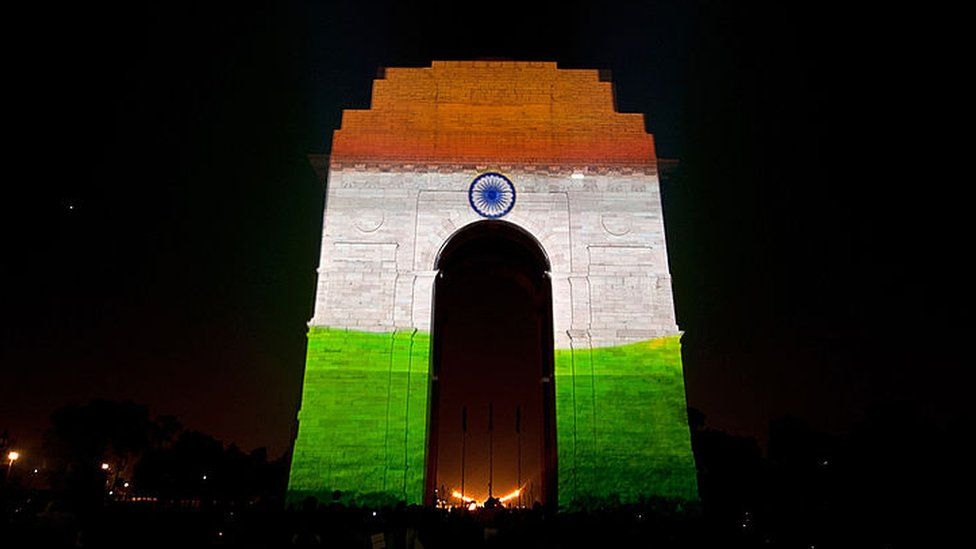Will India dash UK trade deal hopes?
- Published

On Sunday Theresa May will land in smoggy Delhi with a large entourage of diplomats, advisers, business people and press in tow.
This is an important visit. It is the new British prime minister's first bilateral meeting outside Europe, the first step in her mission to "forge a new global role for the UK".
It is obvious why she has chosen India. Where better to demonstrate the world of opportunity that awaits a post-Brexit Britain?
India is now the world's fastest growing large economy, with GDP growth of more than 7% a year and a 1.25 billion-strong market of increasingly wealthy consumers.
There should be a lot of warm words about the two countries' long-standing ties, their special relationship and their shared values.
The Indian Finance Minister, Arun Jaitley, was already talking of co-operation and future partnerships when I interviewed him on Thursday.
But do not be deceived by the diplomatic dance.
Diwali, the festival of lights - India's great seasonal celebration of optimism and hope - has just finished.
It is a time of extraordinary generosity. People throw lavish parties with delicious food, plenty of drink and raucous rounds of Teen Patti - India's answer to poker.
I attended a string of these in New Delhi's gracious diplomatic district. Each brought more evidence that India's Diwali generosity does not extend to trade deals with the UK or anyone else.
There was the top Indian diplomat who dismissed Mrs May's visit as "an afterthought".
He had arrived in a sleek, black BMW. The white Hindustan Ambassadors that used to be the badge of status in India's rigid governmental hierarchy are not so prized any more.
The British asked for Mrs May's visit to be brought forward from December and he told me: "This is about politics in the UK, not about what we want."
Informal trade talks have already started, again at Britain's behest.
Under EU rules,the UK cannot do any actual deals until it leaves Europe, but with a "hard Brexit" - where it leaves the single market - looking a real possibility, it wants to get the ball rolling as soon as possible.
"Good luck with that," laughed the ambassador of a major economic power as he sipped from a flute of champagne at another Diwali do. "We've been trying to get a deal for years now, but there's not much in it for India."
India was a closed economy until the early 1990s, he explained and still has comparatively high barriers to foreign imports. Meanwhile most of the developed world has been cutting back restrictions on trade.
"What's more," continued my new friend, "it's doing well behind those barriers. It means they want really big concessions before they'll sign up to anything."
The European Union had the same problem.
Peter Mandelson began free trade talks between the EU and India when he was European trade commissioner back in 2007. There have been 16 separate formal rounds of negotiations in the nine years since then, but very little progress.
You only need to look at the sticking points to see why the UK is unlikely to fare any better, says Sir Thomas Harris, a former ambassador to Korea who ran the UK India Business Council for many years.
India consistently refused to lift restrictions on professional services including accounting, insurance, banking and legal services, he points out. These are some of Britain's strongest sectors and exactly the kind of businesses to which Britain wants India to open up.
"For the life of me, I cannot see why the Indians would be prepared to offer concessions on services in bilateral talks with the UK which they were not prepared to offer in return for access to the EU as a whole," he says.
And then there is the even more vexed question of immigration.
During the trade talks, Europe refused India's requests for more temporary visas for professional workers.
On the face of it, Mrs May's government is unlikely to be any more forthcoming. Its policy is that the number of immigrants needs to be cut dramatically.
At the Conservative Party conference last month, the Home Secretary, Amber Rudd, talked about the possibility of new curbs on foreign workers and students.
The Chancellor of the Exchequer, Philip Hammond, has since hinted he is minded to be a little more flexible on professional workers. But it is hard to overstate how badly the government's rhetoric on immigration goes down in India.
"The impression Britain is giving to countries such as India is 'we want your business but we don't want your people'," is how a former advisor to the Indian Prime Minister, Narendra Modi, put it in an Indian newspaper.
When I quoted that to a top British diplomat he squirmed in discomfort.
"The government is going to have to find a way to articulate its policy more clearly," was his "diplomatic" suggestion.
Mrs May's visit to India is the first big test of whether it can do that.
If Britain is to prosper, Mrs May needs to be able to show that forging strong non-EU alliances can be reconciled with her hard-line stance on immigration.
She also needs to demonstrate that it is possible to do trade deals that deliver real benefits to Britain.
My Diwali party circuit suggests both ambitions are going to be hard to fulfil.
- Published4 November 2016
- Published4 November 2016
- Published7 September 2016